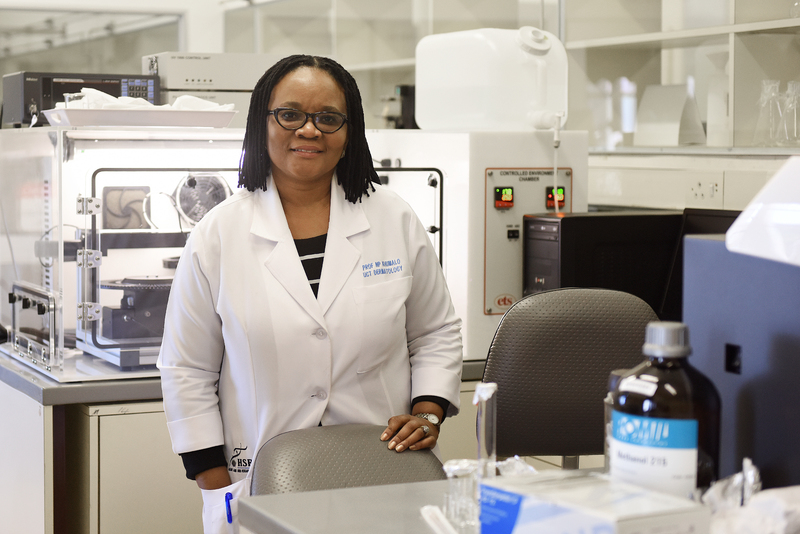New diploma in cosmetic formulation
26 June 2017 | Story Chido Mbambe. Photo Robyn Walker.
In the wake of its much-publicised findings on the health risks of Brazilian hair treatments and skin lightening creams, UCT’s Hair and Skin Research Laboratory in the Division of Dermatology has announced a new diploma for science graduates.
The advanced diploma will create a new career path for BSc graduates who wish to follow a career in cosmetics. It will be convened by Professor Nonhlanhla Khumalo, head of dermatology, alongside Dr Nicole Vorster and Ntombi Sishi, who has over 20 years of experience in cosmetic formulation.
“Historically there is a worldwide disconnect between dermatologists and cosmetic formulators, which leads to dermatologists only reacting to treat a large number of side effects without much input into their prevention,” says Khumalo.
Prioritising health and safety in cosmetic formulation led to the Division of Dermatology’s decision to create the qualification.
The division’s experience with anatomy and the physiology of skin and hair, as well as their focus as healthcare professionals on disease prevention, puts them in a position to collaborate with chemists in training cosmetic formulators who will put safety above product performance.
“The cosmetic industry in South Africa is largely based on big corporate companies where most of the formulation research and development takes place overseas,” explains Khumalo. “The result being that the industries in South Africa focus more on manufacturing, packaging and sales rather than on problem-solving and new product development and the use of alternative, safer raw materials.”
First of its kind in SA
The diploma will offer students knowledge in basic hair and skin anatomy, adverse effects of cosmetics, cosmetic ingredients, cosmetic formulations, product development processes, efficacy assessment, product safety, quality management and cosmetics regulation.
“Having the diploma within the Division of Dermatology is a deliberate choice that aims to reduce the divide between scientists, who develop cosmetic products, and dermatologists, who treat the many adverse effects from unscientific and toxic ingredients in cosmetic products,” explains Khumalo.
“Having dermatologists contribute and teach on this programme will sensitise students on potentially deleterious health effects cosmetic products can have on consumers.
“The collaborative training and research environment at the Hair and Skin Research Lab will enable research excellence and produce high quality scientific evidence that will feed into policy, strategy and human resource development in this important area of South African society,” she says.
Cosmetic formulators currently receive on-the-job training or do a part-time post-matric diploma in cosmetic science. The UCT diploma is pitched at a higher, post-BSc level and aims to give students practical experience in product formulation.
Giving students a head start
The new one year Advanced Diploma in Cosmetic Formulations will be a blended programme allowing both theoretical training and hands-on practical experience. Students will attend two blocks of up to three weeks on site at UCT and the rest of year students will be attached to a research and development lab of a local cosmetic company selected by the Services Sector Education Training Authority (SETA).
Anyone with a BSc or an undergraduate diploma in the scientific field can apply. Students who would like to continue studying can advance to a BSc(Med)(Hons) and then a master’s and PhD specialising in trichology and cosmetic science.
“We would like to advantage unemployed graduates,” says Prof Khumalo. “In this first round of the diploma we have bursaries for science graduates who are unemployed."
The initial one-year programme caters for a group of eight students and will start on 17 July 2017, ending in July 2018.The programme will then revert to the normal schedule with a second intake of about 20 students starting in January 2018.
The deadline for the current call is 30 June. Applications for the January 2018 course will close on 30 October 2017.
“After completing the course, SETA will also assist with placements in the industry,” concludes Khumalo.
 This work is licensed under a Creative Commons Attribution-NoDerivatives 4.0 International License.
This work is licensed under a Creative Commons Attribution-NoDerivatives 4.0 International License.
Please view the republishing articles page for more information.










